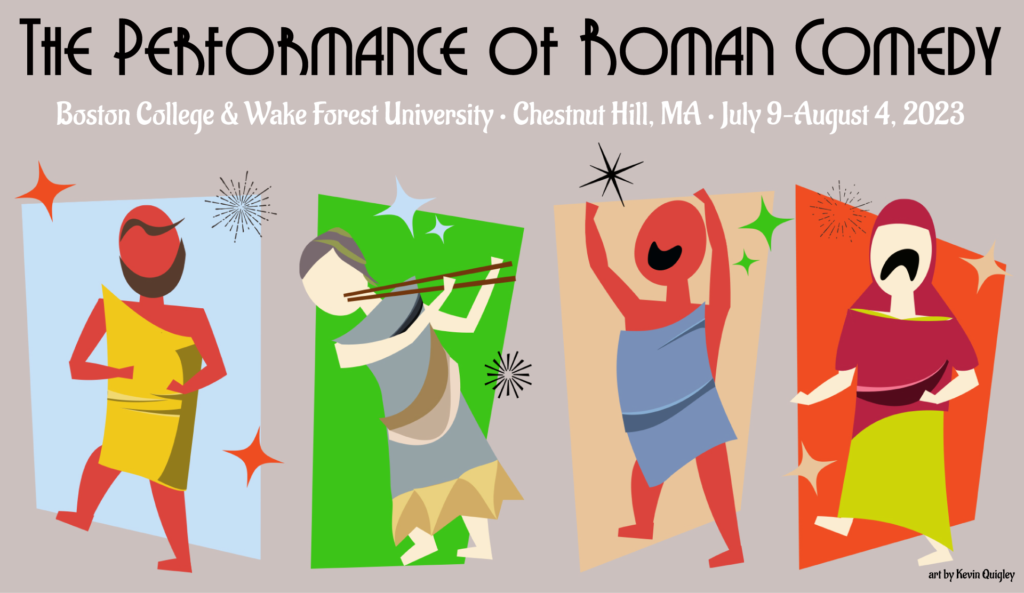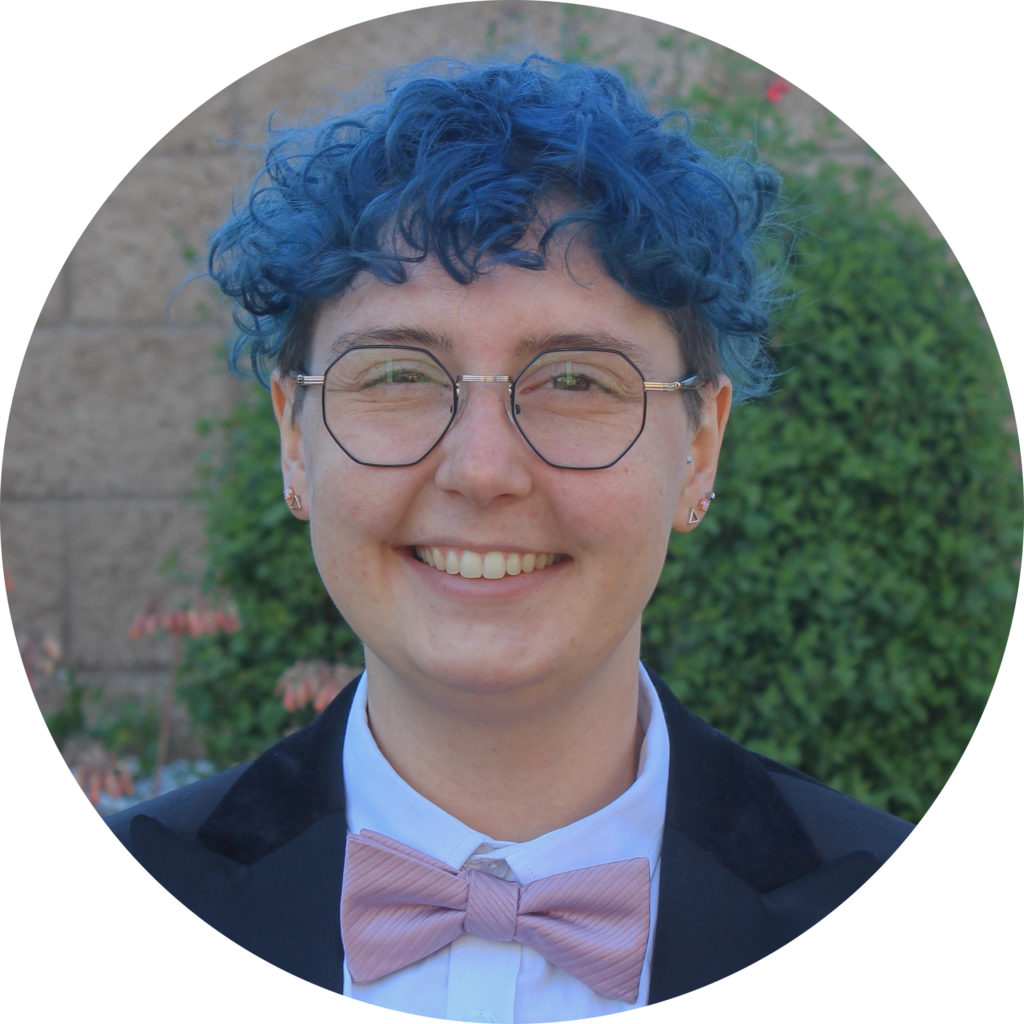Participants

Sarah Brucia Breitenfeld

Sarah Brucia Breitenfeld is a Center for Faculty Diversity Fellow and Visiting Assistant Professor of Classics at Davidson College. Beginning in Fall 2024, Dr. Breitenfeld will join the faculty of the University of Pittsburgh as an Assistant Professor of Classics. They are a social historian with a particular interest in the connections between gender and slavery. Their publications include an examination of the intertextual relationship between the Iliad and Xena: Warrior Princess in The Routledge Companion to the Reception of Ancient Greek and Roman Gender and Sexuality (2022) and two separate contributions to forthcoming volumes: a chapter on enslaved female war captives in Brill’s Companion to War Violence in the Ancient Mediterranean World and another on the curse tablet RIB 154 from Roman Aquae Sulis in Inscriptions and the Epigraphic Habit: Brill Studies in Greek and Roman Epigraphy. Their current book project explores the experiences of enslaved women living in Classical and Hellenistic Greece.
Keith Clavin

Keith Clavin is Senior Lecturer at the Massachusetts Institute of Technology. His research fields include Victorian Studies, History of Comedy, and Cuban Studies. He has written on the work of Charles Dickens, Thomas Hardy, Francisco Manzana, and various nineteenth-century economists. Most recently, his chapter titled ‘Histories Yet to Come: Adventure Fiction and the Ideologies of Free Trade’ appears in Re-Reading the Age of Innovation: Victorians, Moderns, and Literary Newness, 1830-1950 (Routledge 2022).
Alexander Creighton

Alexander Creighton (he/they) is an ACLS Emerging Voices Postdoctoral Fellow at U.C. Berkeley. He works in eighteenth-century literature; women’s, gender, and sexuality studies; animal studies; and the comparative arts. He earned his Ph.D. in English and Studies of Women, Gender, and Sexuality from Harvard University in 2021.
Joe Droegemueller

Joe is a 3rd-year PhD student in Classics at the University of Michigan. He completed his BA at Boston University in Ancient Greek and Latin (summa cum laude). His research interests include Roman comedy and its ancient and modern reception, the ancient theatrical experience, the emotions and senses, and studies of enslaved and low-status individuals.
Anne Feltovich

Anne Feltovich specializes in Greek and Roman Comedy, gender and sexuality, and material culture of Ancient Greece. She teaches courses on ancient Greek and Latin language, history, and culture. She has participated in archaeological excavations in Athens, Corinth, and Pylos, Greece. She received her bachelor’s degree in Classics from Grinnell College and her doctorate in Classical Philology from the University of Cincinnati. Current research projects include a book on Women’s Social Bonds in Greek and Roman Comedy.
Alison Futrell

Alison Futrell is an Associate Professor in the Department of History at the University of Arizona. Her research interests focus on the discourse, performance, and imagery of power in imperial Rome, with special interest in spectacle and gender. She is likewise attentive to manifestations of the ancient Mediterranean in modern mass culture, with publications on The Viking Queen, Spartacus, HBO’s Rome, and Xena: Warrior Princess and a monograph in progress on Dangerous Histories: Mystic Truths, Exotic Doom, and Deadly Queens. She is the author of Blood in the Arena (1997) and Roman Games (2006) and co-editor of the Oxford Handbook of Sport and Spectacle in the Ancient World (2021). With Paul Milliman, she is co-creator of the University of Arizona Enhanced Experience for Age of Empires IV. She has appeared frequently as an on-camera commentator for documentaries, shorts, and series, most recently for Colosseum (an eight-part series on the History Channel), for National Geographic, and for BBC History Extra, holding forth on such topics as gladiators, the Roman arena, Spartacus, Cleopatra, Boudica, Hannibal, and the Bible.
Lauren Donovan Ginsberg

Lauren Donovan Ginsberg is an Associate Professor of Classical Studies and Theater Studies at Duke University. She specializes in Roman historical drama and Roman tragedy of the early empire, the Roman cultural memory of civil war (especially as mediated by works of drama), and the age of Nero and its reception. She is the author of Staging Memory, Staging Strife: Empire and Civil War in the Octavia from Oxford University Press (2016) as well as articles on Senecan tragedy, Roman historical drama, Caesar, Tacitus, and Lucan. Outside of her research and teaching, she has worked with theater companies, directors, playwrights, and composers in various ways in connection with productions of modern works on Roman themes.
Nicholas Gomez

Nick Gomez is a PhD Candidate in Rhetoric and Composition at Saint Louis University where he teaches writing and literature courses on topics such as Ecological Rhetoric, Medical Humanities, and Gender & Identity. His dissertation traces a genealogy of Roman perspectives on ingenium [innate capacity] and attempts to theorize an original stance on talent and natural ability as ecological and collective phenomena.
Elizabeth Heintges

Elizabeth Heintges is a Ph.D. candidate in Classics at Columbia University, where she is writing her dissertation on shifting cultural, political, and poetic responses to Sextus Pompey and the bellum Siculum in the triumviral and Augustan periods. Her research interests include Latin poetry, numismatics, and the social and cultural histories of Hellenistic and Roman Sicily, and she has recently published an article on Sicilian landscape in Claudian’s de raptu Proserpinae. Elizabeth has performed in multiple productions in ancient Greek with the Barnard/Columbia Ancient Drama Group: past roles include Iphigenia in Euripides’ Iphigenia in Aulis, Herakles inSophocles’ Trachiniae, Creusa in Euripides’ Ion, and the Chorus in Aeschylus’ Choephoroi.
Corey David Hotard

Corey David Hotard holds a PhD in both Geography and Anthropology with a minor in Performance Studies. His dissertation looked at gumbo cooking as a performance in South Louisiana cooking. He is a geography instructor at South Louisiana Community College, where he teaches both Geography and Anthropology courses. He is also a Master’s Student in Classical Studies at Villanova University. His interests include classical comedy, ancient burials, classical foodways, and identity in the classical world.
Jay Houston

Jay Houston is a Pre-Doctoral Fellow at Princeton University primarily interested in Augustan Age Latin poetry and the intersection of narrative and identity in classical literature and its reception.
Anett K. Jessop

Anett K. Jessop, Ph.D., is Associate Professor of English at The University of Texas at Tyler, where she teaches 20th- and 21st-century American literature and creative writing. Recent relevant publications include “‘Untranslatable’ women: Laura Riding’s classical modernist fiction” (The Classics in Modernist Translation, 2019); “Modernist Revisionist Mythmaking: Laura Riding’s Lilithian Poetics” (Women Poets and Myth in the 20th and 21st Centuries, 2018); “The Classical Past and ‘the history of ourselves’: Laura Riding’s Trojan Woman” (Brill’s Companion to Classical Receptions: International Modernism and the Avant-Garde, 2017); “Geopoetics and Historical Modernism: Gertrude Stein, Laura Riding and Robert Graves in Mallorca, 1912–1936” (Mediterranean Modernism; Intercultural Exchange and Aesthetic Development, 1880–1945, 2016). Forthcoming include “Gertrude Stein Off Center in Spain, 1901–1916” (Nomadic New Women 1900–1945: Exile and Border-Crossing between Spain and the Americas) and “The ABCs of Reading (Laura) Riding: Modernism for Children” (Children’s Association Quarterly Journal). Additionally, Anett Jessop has contributed chapters on Anglophone modernist and contemporary women writers to the Oxford University Press’s Encyclopedia of American Literature and Greenwood Press’s Contemporary American Women Poets. Her essays on the 20th-century Iranian poets Nima Yushij and Forugh Farrokhzad appeared in Companion to 20th-Century World Poetry. Scholarly reviews, creative writing, arts reviews, and artwork have also appeared in H-Net Reviews, The Agassiz Review, The New Art Examiner, Magazine of the Minneapolis Institute of Art, The Minnesota Daily, The Lake Street Review, Jaw Magazine, ArtPolice, Berlitz, Una/Duessa, Loonfeather, Minnesota Women’s Press, Sacramento Poetry Now, Aufgabe.
Allison Jodoin

Allison Jodoin is a PhD student at Boston University. She received her BA from the University of Vermont in 2020 and her MA from the University of Kansas in 2022. One of her main areas of interest is modern performances of ancient theater, and, at UVM, she stage managed productions of Euripides’ Helen (2018) and (almost!) Aristophanes’ Clouds (2020).
Emily Lord-Kambitsch

Emily Lord-Kambitsch, PhD (University College London), MSt (University of Oxford) is Co-Chair and Associate Core Faculty of Mythological Studies at Pacifica Graduate Institute. Trained in classical philology and reception studies, she is a lifelong student and celebrant of the process of translating and transforming old stories into houses of meaning that give quarter to the ongoing dilemmas and delights of individual and community identity formation. Her research on the representation of ancient emotions in modern historical fiction, theatre, and cinema has yielded publications in the journal, Nineteenth Century Theatre and Film, and the collections, Rewriting the Ancient World: Greeks, Romans, Jews and Christians in Modern Popular Fiction (Brill, 2017) and Star Attractions: Twentieth-century Movie Magazines and Global Fandom (University of Iowa Press, 2019). Her current research traces the relationship between memory, longing, and selfhood in the voices of women from Greek tragedy. Emily is also a poet-storyteller, facilitator of workshops exploring myth through intuitive movement, and a novice improvisational actor. Her debut poetry chapbook, a memoir, Western Yoga: A Field Report on Desertion and Deliverance was published by Bottlecap Press in 2023. For more information about her work, see her website: https://www.emilylordkambitsch.com/.
Mary McAvoy

Dr. Mary McAvoy is an associate professor in the School of Music, Dance and Theatre at Arizona State University. She directs undergraduate and graduate programs in Theatre for Youth and Community. Her research and creative practice focus on histories of theatre and drama in educational contexts; performance pedagogy and activism (particularly in US labor movements); educational theatre/drama, theatre teacher preparation, and teaching artistry; radical and experimental performance in youth cultures; and arts education policy. She teaches courses in theatre history, research methods, and theatre pedagogy. She is the author of Rehearsing Revolutions: The Labor Drama Experiment and Radical Activism in the Early Twentieth Century, co-author of Drama and Education: Performance Methodologies for Teaching and Learning and co-editor of The Routledge Companion to Drama in Education and Youth and Performance: Perceptions of the Contemporary Child. Her articles have appeared in Youth Theatre Journal, The Journal of American Drama and Theatre, Arts Education Policy Review, and various edited collections. She serves on the editorial board and has guest edited for multiple journals.
Michael Mignanelli

Michael Mignanelli is a lecturer in Classics in the Department of Classics, Humanities, and Italian Studies at the University of New Hampshire. He earned his B.A. in Classics from the University of New Hampshire and his M.A. in Classics from the University of Texas at Austin, where he is currently completing his Ph.D. Mignanelli has previously served as an adjunct Professor of Latin at Austin Community College, an instructor at the University of Texas at Austin, and a Resident Instructor at the Intercollegiate Center for Classical Studies. His dissertation project explores the intimate relationship between fifth-century Athenian law and daily life as reflected by the corpus of Aristophanes. Among his other research interests, Mignanelli is passionate about ancient performance culture and previously served as the director of UT Ancient Drama, a performance group dedicated to performing “problem plays,” defined loosely as those plays that have received little attention due to issues such as lacunae, questions about staging, and genre constraints. Currently, he is the director of UNH Ancient Drama and is directing a performance of Euripides’ Cyclops, which is slated for May 2023.
Grace Miller

Grace Miller graduated from The University of North Carolina at Chapel Hill with a BA in Combined Greek and Latin in 2021. Her research interests largely center around the exploration of subaltern life in Roman comedy and on modern reception of Greek tragedy. Her senior thesis explored the expectations of the owner classes concerning their enslaved persons’ labor in Plautus’ work, and how that expectation differs based on the gender of the enslaved person. She has been developing these interests while pursuing a Ph.D. at UCSB and is excited to bring any insights to NEH’s performance of Roman comedy. She hopes to encourage the next generation of students to see the liveliness of Roman comedy through the NEH performances.
Alex Ostaltsev

Alex Ostaltsev is a PhD student in the Comparative Literature program at the University of Texas at Austin. He holds an MA in British and American Literature from Florida Atlantic University and earned a BS in Russian language and Literature and European Literature in Ukraine. His scholarly interests include Russian history and literature; classical literature and philosophy; and European literature, religion, and arts. He is currently working on the problem of representation of a literary character in European literature of different periods. He speaks Russian, Ukrainian, and English. He is author of two books of fiction.
Emma Pauly

Emma Pauly (they/she) is a graduate student in the Classics department at UCLA specializing in queer and divine embodiment in Attic tragedy, myth, and reception, with a sub-speciality in Euripides’ Bacchae. Emma’s background in the performing arts, including an M.A. in acting from the Bristol Old Vic Theatre School and several years of work as a performer and freelance dramaturg, are central to their praxis as they explore ancient and contemporary performance not only as an object of analysis, but a means of inquiry and replenishment. When not engaged in academia, Emma can typically be found playing Dungeons & Dragons, cooking, or somewhere in the vicinity of a body of water, though typically not all three at once.
Allie Pohler

Allie Pohler (she/her) is a Ph.D. candidate in Classical Philology at the University of Cincinnati. She specializes in Roman comedy researching questions of gender, class, enslavement, and trauma/violence. Her dissertation, “Terence’s Offstage Virgo: The (De)construction of a Stock Character,” investigates the ways in which comic stock characters construct differing versions of Terence’s offstage virgo informed by their own interests and identity (esp. civic status, gender). She argues that the image of the virgo offers Terence’s audience a consistent and productive site for negotiating the complex social problems that circulate around young, vulnerable women. Her other research and teaching interests include Greek tragedy, Greek novel, Roman novel, and Roman elegy. She holds an M.A. in Classical Philology from the University of Cincinnati. She received her B.A. in Classics and B.S. in Psychology from Grand Valley State University.
Cypris Roalsvig

Cypris Roalsvig is a Ph.D. student in the Department of Classics. Cypris graduated from Johns Hopkins University with a B.A. in English Literature and M.A. in Classics. They study the modern reception of Greek and Latin literature and the reinterpretations of classical mythology and drama in modern queer literature and theater. They also have an appreciation for ancient material culture; they have worked in an archaeological museum, a study collection, a ceramics preservation lab, a field school, and an excavation. Their Master’s thesis researches the queer undertones of Orpheus’ backwards glance, studying his characterization in classical sources and comparing it to queer poetry and film in modern reception. They research representations of subordinate characters: how the thoughts and actions of female, queer, and transgender characters are described by the inherent biases of their male authors. Their research centers queer, feminist, and trans theory as a new framework to read ancient stories from new and marginalized perspectives, by providing new translations and radical dramatic productions of ancient works.
Alyson Roy

Alyson Roy is an Assistant Professor of Ancient History at the University of Idaho. Her research focuses on the Roman Republic, visual culture, and notions of identity, prestige, and performance. Her forthcoming book, under contract with the University of Texas Press, analyzes the development and consumption of conquest imagery in Roman provinces. She has recently published on Gallic imagery with Nuova Antologia Militare, and has a chapter in the forthcoming volume Cultural Memory in Republican and Augustan Rome (ed. Dinter and Guérin) with Cambridge University Press (April 2023).
Henry Schott

Henry Schott is a PhD candidate in the Ancient Performance track at Washington University in St. Louis. His research interests revolve around Roman comedy, its performance, and how best to define the genre. Outside of research he helps with the NJCL Convention most years, helping run Certamina and Agon in addition to writing tests.
Hannah Sorscher

Hannah Sorscher has a Ph.D. in Classics from the University of North Carolina at Chapel Hill, where she wrote her dissertation on young women and families of choice in Roman comedy. She has continued to study and teach Roman comedy (among other topics in Latin literature and women in antiquity), at Eberhard Karls Universität Tübingen in Tübingen, Germany, in 2021–2022; and at the Intercollegiate Center for Classical Studies in Rome in 2022–2023, where she leads students around Rome, Italy, and Provence, teaching Latin, Greek, and Roman social history. Next year, she will join the faculty of the Classics Department at Colby College in Waterville, ME.
Rebecca Stone Thornberry

Rebecca Stone Thornberry is Associate Professor of Theatre and Women and Gender Studies at UW-Green Bay where she currently teaches Acting, Voice for the Actor, Theatre History, and World Theatre and Performance. She holds a Ph.D. in Theatre from the University of Colorado at Boulder and an M.F.A. in Acting from The Ohio State University, and has presented her scholarly work through both the Association of Theatre in Higher Education and the Mid-America Theatre Conference. As a director, she has led productions which include The Effect, Circle Mirror Transformation, The Laramie Project, Fuddy Meers, Into the Woods, The 25th Annual Putnam County Spelling Bee, The Diary of Anne Frank, A Midsummer Night’s Dream, All My Sons, Dead Man’s Cell Phone, These Shining Lives, and The Last Night of Ballyhoo. From 2011-2020, she was the artistic director of Theatre on the Bay, a 50+ year old community and educational theatre in Marinette, WI. Rebecca has professional acting credits with the Peterborough Players (NH), Resonance Ensemble (NYC), and Oberon Theatre Ensemble (NYC), among others. She has also worked as a dramaturg with the Colorado Shakespeare Festival. She most recently appeared onstage in a local (WI) production of Boeing Boeing. She can currently be seen in the 2017 feature film Aquarians, now streaming on Amazon Prime Video.
Anise K. Strong

Anise K. Strong is an Associate Professor of History at Western Michigan University, specializing in Roman History, global histories of genders and sexualities, and reception studies. Her first book, Prostitutes and Matrons in the Roman World, drew extensively on Roman comedy as a source. She is currently working on her second book on the representation in modern mass media of ancient Mediterranean women’s desire and power.
Madelaine Thompson

Madelaine Thompson is a PhD candidate in Classics at the University of Chicago, where she is writing a dissertation on character in the plays of Plautus. She is interested in how these characters’ worldviews shift when they are faced with intense uncertainty. Her other research interests include satire (especially Petronius), translation studies, and the application of cognitive theory and psychology to Classics.
Brian D. Valencia

Dr. Brian D. Valencia is a historian, dramaturg, composer, lyricist, director, musical director, and performer. He holds a doctorate in dramaturgy and dramatic criticism from the Yale School of Drama, as well as MFAs from Yale and NYU/Tisch, and has also taught at Yale, New World School of the Arts, the University of Miami, and Ohio University. He currently teaches musical theater history at Florida International University. In addition, Brian is a past visiting research fellow at the American Antiquarian Society and Harvard’s Houghton Library, and is an alum of Harvard University’s Mellon School for Theater and Performance. His scholarly writing and reviews have appeared in Twentieth-Century and Contemporary American Literature in Context, The Palgrave Companion to Musical Theatre Producers, The Routledge Companion to Dramaturgy, Studies in Musical Theatre, Contemporary Theatre Review, Common-place, Theater magazine, and the New York Public Library’s Musical of the Month project. His forthcoming book will unearth a social network of eighteenth-century musical-theater-makers who laid the foundation for a national culture of musical theater in America—before Broadway was Broadway. He is the editor of Books in Review for New England Theatre Journal. As a practitioner, Brian has collaborated on numerous theatrical works seen and heard in New York City, where he was a research consultant on the 2016 Broadway production of Shuffle Along, in addition to Washington, D.C.; Miami; New Haven, Connecticut; and Seoul, South Korea.
Emma Warhover

Emma Warhover earned a PhD in Classics at UNC-Chapel Hill with a dissertation on Tacitus’ use of humor in his historical works. She is currently a visiting assistant professor at Grand Valley State University. Her research focuses on rhetorical uses of humor in ancient Roman historiography, so she is excited to spend part of this summer working with texts by known comedians.
Shadow Zimmerman

Dr. Shadow Zimmerman is Visiting Assistant Professor of Theatre History, Literature, and Criticism at Northern Arizona University. His research explores the limits of liberalism and the racial relationships of the historical avant-garde. He has presented at the conferences for multiple organizations, from the American Society for Theatre Research to the Literary Managers and Dramaturgs of America. His scholarship has been featured in Theatre Symposium, The Black Theatre Review, and How to Teach a Play and will be included in the upcoming collection, The Figure of the Monster in Global Theatre History (2024).
The Performance of Roman Comedy has been made possible by a major grant from the National Endowment for the Humanities: Democracy demands wisdom.

Any views, findings, conclusions, or recommendations expressed in this program do not necessarily represent those of the National Endowment for the Humanities.
